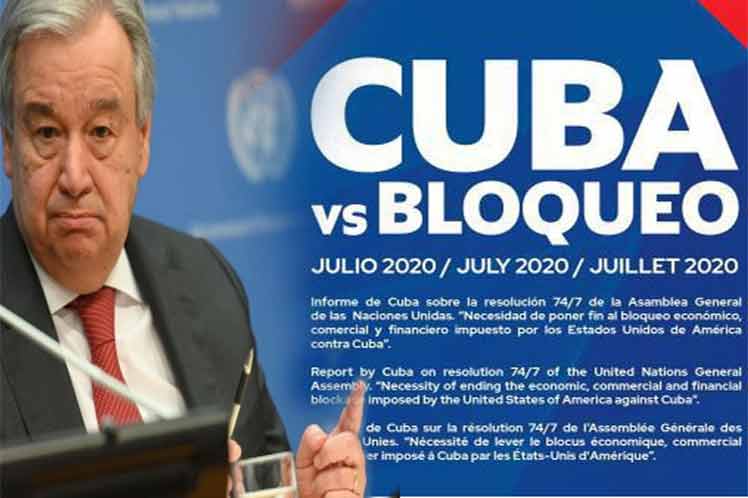Havana, Cuba: The United States blockade against Cuba today maintains an extraterritorial nature that also harms the member states of the European Union (EU), according to a report by the United Nations (UN), Prensa Latina publishes.
According to the report of the UN Secretary General, António Guterrres, the measures imposed on the Island negatively affect the interests of the European Union and violate generally accepted norms of international trade.
The document of the UN head on this issue is published each year under the heading of ‘Need to end the economic, commercial and financial blockade imposed by the United States of America against Cuba’.
The report includes the contribution of 160 member states of the multilateral organization, including the EU.
In addition, it brings together information from 34 international organizations and agencies, funds and programs of the United Nations system on how the blockade affects Cuba, including in relation to those entities.
‘The European Union and its member states have clearly and on several occasions expressed their opposition to the extraterritorial extension of the blockade imposed by the United States, which is established in the 1992 Cuban Democracy Act and the Helms-Burton Act. , 1996, among other instruments’, the report refers.
The document also addresses the legal actions and regulations approved to protect the interests of natural and legal persons in the EU against the extraterritorial application of the Helms-Burton Act.
Likewise, the European entity regretted the recent decision of the United States government to activate title III and to resume the application of title IV of that legislation.
According to the EU, this violates a 1998 agreement whereby both parties agreed not to apply those titles.
This pact also established Washington’s commitment not to enact extraterritorial laws in the future and was based on an understanding to strengthen the protection of investments.
“The European Union recalls that it has fulfilled, and continues to fulfill, the commitments it made in that Agreement and urges the United States to do the same”, the text states.
The report underlines the intention to use all available instruments and options to protect the economic activities of European Union nationals and companies, including their investments.
In this same Guterres document, other examples of the negative influence of the blockade on diplomatic relations between Cuba and other nations are listed.
However, the Caribbean nation has the majority support of the international community against the encirclement of the United States, despite its extraterritorial nature.
According to the Cuban Foreign Minister, Bruno Rodríguez, this shows that Washington’s hostile policy increases the discredit and isolation of that country on a global level.
Cuba recently presented the report that includes the damage caused by the United States blockade from April 2019 to March 2020.
In that period, the Office for the Control of Foreign Assets imposed 12 penalties on US and third-country entities that exceeded two thousand 403 million 985 thousand 125 dollars.
On the other hand, on May 2, 2019, legal proceedings were initiated under the Helms-Burton Act for the first time in 23 years, a policy that affects US and third-country companies with business in Cuba.
In the general debate of the 74th session of the United Nations General Assembly (September 2019), dignitaries from 43 countries denounced the blockade imposed by the US and called for its immediate lifting.
During the last vote at the UN, at the end of 2019, Cuba’s initiative to end the blockade reached 187 votes in favor, three against and two abstentions. (BSH)

Redacción Digital
Equipo de redactores del sitio web de Radio Mayabeque



